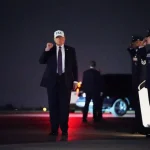
In what could be the beginning of a trend, Japanese company Kyocera is now investing in production in its home country of Japan because it says China can no longer be relied on as the "world's factory".
US sanctions on China's access to advanced technology have become a headwind in the country's ability to act as a manufacturing base for exports, a new report from FT says. Kyocera is constructing its first factory in Japan in almost 20 years as a result.
President Hideo Tanimoto said: “It works as long as [products are] made in China and sold in China, but the business model of producing in China and exporting abroad is no longer viable. Not only have wages gone up, but obviously with all that’s happening between the US and China, it’s difficult to export from China to some regions.”
The headwinds come from export controls that were put into place by the US back in October 2022. Japan and the Netherlands joined the US in their sanctions.
Kyocera is responsible for producing a wide range of electronics that would benefit from China's labor, including phones, printers and solar panels. It also holds a 70% share in ceramic components for chip manufacturing equipment. The company cut its full year operating profit outlook this month by 31% as a result of the export controls.
Tanimoto continued: “If chip equipment makers stop shipments to China, our orders will be somewhat affected . . . They are now even [being] asked not to ship their non-cutting-edge tools.”
It's not the first time Kyocera has had to make changes thanks to US sanctions. Back in 2019 it had to relocate its copier manufacturing from China to Vietname due to Trump-imposed tariffs. It also moved part of its in-vehicle camera business from China to Thailand.
Under the new controls, its "nearly impossible to produce hardware in China", Tanimoto said. He has resisted calls from shareholders to sell off lesser performing portions of Kyocera's business and is focused on trying to save the company's full portfolio of products.
He concluded: “I believe we can get back to double-digit profits after pivoting to business use. I told our team to achieve it in the next three years for the survival of our communications business.”
In what could be the beginning of a trend, Japanese company Kyocera is now investing in production in its home country of Japan because it says China can no longer be relied on as the “world’s factory”.
US sanctions on China’s access to advanced technology have become a headwind in the country’s ability to act as a manufacturing base for exports, a new report from FT says. Kyocera is constructing its first factory in Japan in almost 20 years as a result.
President Hideo Tanimoto said: “It works as long as [products are] made in China and sold in China, but the business model of producing in China and exporting abroad is no longer viable. Not only have wages gone up, but obviously with all that’s happening between the US and China, it’s difficult to export from China to some regions.”
The headwinds come from export controls that were put into place by the US back in October 2022. Japan and the Netherlands joined the US in their sanctions.
Kyocera is responsible for producing a wide range of electronics that would benefit from China’s labor, including phones, printers and solar panels. It also holds a 70% share in ceramic components for chip manufacturing equipment. The company cut its full year operating profit outlook this month by 31% as a result of the export controls.
Tanimoto continued: “If chip equipment makers stop shipments to China, our orders will be somewhat affected . . . They are now even [being] asked not to ship their non-cutting-edge tools.”
It’s not the first time Kyocera has had to make changes thanks to US sanctions. Back in 2019 it had to relocate its copier manufacturing from China to Vietname due to Trump-imposed tariffs. It also moved part of its in-vehicle camera business from China to Thailand.
Under the new controls, its “nearly impossible to produce hardware in China”, Tanimoto said. He has resisted calls from shareholders to sell off lesser performing portions of Kyocera’s business and is focused on trying to save the company’s full portfolio of products.
He concluded: “I believe we can get back to double-digit profits after pivoting to business use. I told our team to achieve it in the next three years for the survival of our communications business.”
Loading…







